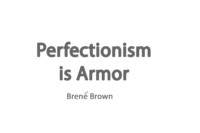Imperfection
I recently read Dr. Brené Brown’s book, “The Gifts of Imperfection: Let Go of Who You Think You’re Supposed to Be and Embrace Who You Are.” Her TED talk on “Vulnerability” is one of the top five most viewed TED talks in the world. She has spent her life researching shame and vulnerability. Through her research, she discovered a group of people she refers to as “Wholehearted.” As a self-professed perfectionist, the research shattered her world and led to a breakdown as she realized the havoc of perfectionism in her own life.
Brené’s thoughts on Perfectionism:
In the research there’s a significant difference between perfectionism and healthy striving or striving for excellence. Perfectionism is the belief that if we do things perfectly and look perfect, we can minimize or avoid the pain of blame, judgment, and shame. Perfectionism is a twenty-ton shield that we lug around, thinking it will protect us, when in fact it’s the thing that’s really preventing us from being seen.
Perfectionism is also very different than self-improvement. Perfectionism is, at its core, about trying to earn approval. Most perfectionists grew up being praised for achievement and performance (grades, manners, rule following, people pleasing, appearance, sports). Somewhere along the way, they adopted this dangerous and debilitating belief system: “I am what I accomplish and how well I accomplish it. Please. Perform. Perfect.” Healthy striving is self-focused: How can I improve? Perfectionism is other-focused: What will they think? Perfectionism is a hustle.
Last, perfectionism is not the key to success. In fact, research shows that perfectionism hampers achievement. Perfectionism is correlated with depression, anxiety, addiction, and life paralysis or missed opportunities. The fear of failing, making mistakes, not meeting people’s expectations, and being criticized keeps us outside of the arena where healthy competition and striving unfolds. Brené Brown
When we strive for perfectionism, we are judging ourselves and admitting we are not good enough the way we are. Perfectionism is the ego’s trickery. It manufactures a world where we feel in control but in actuality, it robs us by taking courage, compassion and connectiveness away. Perfectionism provides rules for judging not only ourselves but others, right down to the type of towels used. It provides justification for us to judge, complain, and be right down mean and vindictive; because our rules were not followed. It is armor for keeping us in ego’s control. Her research shows that perfectionism can lead to suffocating those close to you.
Her breakdown was fostered in part by her realization that her perfectionism was creating stress, anxiety, depression, and not how she wanted to live her life. She called it a mid-life unraveling. She longed for the joy and peace she researched in whole-hearted people. She realized that her perfectionism was holding her back. She needed to do what her book is sub-titled, “Let Go of Who You Think You’re Supposed to Be and Embrace Who You Are.” She turned her breakdown around with the help of a therapist to a Spiritual Awakening. In her book, she discusses the many ways she brought joy into her life but the most impactful way was adding spiritual practices in her life and giving control of her life to God instead of her ego. She accepted the challenges of using her gifts to help others even more by being courageous and living out of her comfort zone as exemplified by her new Netflix special, “Call to Courage.” She used her intuition (how the Holy Spirit talks to us) to guide her life instead of arguing against it. She learned to give compassion, not only to others, but most importantly to herself.
Brené refers to herself as a recovering perfectionist and is now living a whole-hearted life exemplified by courage, compassion, and connection. She’s learning how to be good enough instead of perfect. As Brené states,
“It makes sense to me that the gifts of imperfection are Courage. Compassion, and Connection because when I think back to my life before this work, I remember being judgmental, fearful, and alone. Human perfection can never be reached; so, when we strive for perfectionism, anxiety will be felt in our bodies. Instead of trying to reach the elusive perfect state, let’s aim for whole heartedness.”
Thank you, Brené for your courage to be vulnerable and to share your personal struggles and to call us to live whole-heartedly with joy in our hearts.
Staying in Touch: Barbara Hirsh can be reached at info@LiveKinder.com I love hearing your kindness stories. Please sign-up for almost weekly kindness message at www.LiveKinder.com or follow LiveKinder on Facebook!




